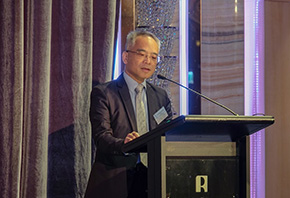運輸及房屋局副局長於香港工程師學會機械、輪機、造船及化工分部第39屆周年晚宴致辭(只有英文)(附圖)2018年5月7日(星期一)
Following is the speech by the Under Secretary for Transport and Housing, Dr Raymond So Wai Man, at the 39th Anniversary Annual Dinner of the Mechanical, Marine, Naval Architecture and Chemical (MMNC) Division of the Hong Kong Institution of Engineers on May 7:
Ir (Ming Yau) Chan, Ir (Chee Kwan) Lee, Distinguished Guests, Ladies and Gentlemen,
Good evening. It is my great pleasure to join you all tonight at the 39th Anniversary Annual Dinner of the Mechanical, Marine, Naval Architecture and Chemical (MMNC) Division of the Hong Kong Institution of Engineers.
The Hong Kong Institution of Engineers, representing our entire engineering profession covering 19 divisions, provides significant contributions to the development of Hong Kong. Over the past five decades, the Institution has played a key role in bringing together engineers of different disciplines, raising professional standards and helping the engineering profession adapt in the rapidly changing society. Speicialised in the marine-related engineering, the MMNC Division of the Institution has been providing an excellent platform for the exchange of knowledge and ideas to enhance the engineering expertise of our fellow engineers in the four disciplines, as well as attracting young talents to join the industry. The MMNC has maintained a high standard of the profession and promoted the continuous improvement of the industry. I take this opportunity to congratulate the MMNC on its 39th Anniversary and wish it continued success in the years to come.
Engineering is the foundation of the world’s development. Ever since the beginning of civilisation, engineers have helped to shape the well-being of society. Their ideas and professions are embodied in many masterpieces of engineering excellence throughout history. In our 150-year long maritime tradition, Hong Kong has developed from a fishing village to an international maritime centre and the incredible development of infrastructure is a crucial part of it. As a densely populated city with a mountainous landscape, Hong Kong has very limited natural, developable land for meeting our demand for urban infrastructure and facilities. Under these geographical constraints, however, we have one of the busiest container terminals in the world. Our thriving world-class port handled nearly 21 million TEUs in 2017, despite fierce competitions from emerging ports in the region. Our port is well-known for its efficiency and comprehensive liner services, with 320 liner services per week connecting to over 470 destinations worldwide. All of these would not be possible without the innovation and dedication of our engineering industry.
Engineering has a proximate relationship with the future development of our maritime industry. In this fast developing era, traditional industries could not sustain without the support from innovation. New technologies, techniques and equipment emerge every day and we must adapt to improve our competitiveness and increase our efficiency. Take the Hong Kong Port as an example. Our Port is currently adopting various technologies in automated operation. The Kwai Tsing Container Terminal No.9-North has launched the remote-controlled rubber-tyred gantry cranes and automated container stacking system earlier this year. By using the remote-controlled system, the crane officers would no longer require to work in the crane cabin in the mid-air. Instead, he could control the cranes in an indoor office. These new technologies will improve not only the efficiency of the port, but also the working environment and occupation safety of the crane officers.
Apart from port operations, the vessel mechanics are also facing challenges from the international arena. The International Maritime Organisation (IMO) has set the year 2020 as the implementation date for 0.5% sulphur content fuel for all vessels. Hong Kong, as an international maritime centre, fully supports IMO’s effort in promoting green shipping. In this connection, we have to develop solutions to improve the efficiency of the engine and reduce emission of pollutants. We need engineers’ support as always, to sustain our maritime industry as well as our environment.
Speaking of sustainability, time makes it inevitable that in every profession, the young replaces the old. I share the same notion with the MMNC that manpower training is the foundation for the sustainable development of our maritime industry. There is nothing more important to get young people interested in science and engineering, for a better tomorrow and for all humankind. On this, the Government has set up a $100-million Maritime and Aviation Training Fund (MATF) in 2014 to nurture talents for the long-term development of the maritime and port industry. The MATF seeks to assist and encourage young students and practitioners of the maritime and aviation sectors to receive maritime or aviation education and training, thereby enhancing the overall competitiveness and professional competency of the industries. Since its inception, MATF has sponsored a number of training and incentive schemes covering various maritime sectors, benefitting over 3 000 students and in-service maritime practitioners as at March 2018.
Last but not least, I would like to take this opportunity to advertise the signature event of the Hong Kong Maritime and Port Board (HKMPB). I am excited to share with you that the HKMPB will be organising the third Hong Kong Maritime Week from 18 to 24 November this year to unite our maritime industry as a strong cluster and raise the community’s awareness of the significant contribution of Hong Kong’s maritime and port industry. Last year, more than 11 000 local and overseas participants attended the 47 events organised during the week. Among the activities, I must thank the MMNC for organising the Technical Seminar in Maritime Engineering and share your expertise with the industry. Riding on the success, I am looking forward to seeing you again this November.
Ladies and gentlemen, the engineering industry will continue to be an important building block for our society. I am confident that with the staunch support from our professional community, we can lead Hong Kong’s maritime and port industry into a vibrant future. Finally, may I wish the Division every success in the years to come and I wish you all an enjoyable evening. Thank you.

 >
>